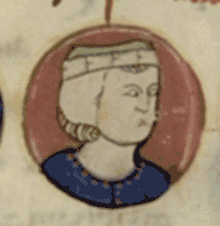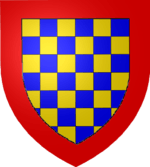Robert II, Count of Dreux
Robert II of Dreux (1154 – 28 December 1218), Count of Dreux and Braine, was the eldest surviving son of Robert I, Count of Dreux, and Agnes de Baudemont, countess of Braine, and a grandson of King Louis VI of France.[1]
| Robert II | |
|---|---|
| Count of Dreux and Braine Lord of Fère-en-Tardenois, Pontarcy, Nesle, Longueville, Quincy-en-Tardenois, Savigny, and Baudemont | |
 | |
| Count of Dreux | |
| Reign | 1184 – 28 December 1218 |
| Predecessor | Robert I |
| Successor | Robert III |
| Count of Braine | |
| Reign | 24 July 1204 – 28 December 1218 |
| Predecessor | Agnes de Baudemont |
| Successor | Robert III |
| Born | 1154 |
| Died | 28 December 1218 (aged 63–64) |
| Burial | |
| Spouse | Mahaut of Burgundy Yolande de Coucy |
| Issue | Robert III Peter I, Duke of Brittany Henry of Dreux John of Dreux Philippa of Dreux Alix of Dreux Agnes of Dreux |
| House | Dreux |
| Father | Robert I |
| Mother | Agnes de Baudemont, Countess of Braine |

He participated in the Third Crusade, at the Siege of Acre[2] and the Battle of Arsuf. He took part in the war in Normandy against the Angevin Kings between 1193 and 1204. Count Robert had seized the castle of Nonancourt from Richard I of England while he was imprisoned in Germany in late 1193.[3] The count also participated in the Albigensian Crusade in 1210.[4] In 1214 he fought alongside King Philip Augustus at the Battle of Bouvines.[5]
Marriages and Children
His first marriage with Mahaut of Burgundy (1150–1192) in 1178 ended with separation in 1181 and produced no children. The excuse for the annulment was consanguinity. Mahaut and Robert were both great-great grandchildren of William I, Count of Burgundy and his wife Etiennete and they were both Capetian descendants of Robert II of France.[6]
His second marriage to Yolande de Coucy (1164–1222), the daughter of Raoul I, seigneur de Coucy and Agnès de Hainaut,[7] produced several children:[8]
- Robert III (c. 1185–1234), Count of Dreux and Braine.[9]
- Peter Ι (c. 1190–1250), Duke of Brittany.[10]
- Henry of Dreux (c. 1193–1240), Archbishop of Reims.[11]
- John of Dreux (c. 1198–1239), Count of Vienne and Mâcon.[12]
- Philippa of Dreux (1192–1242), who married Henry II of Bar.[13]
- Alix of Dreux, married Walter IV of Vienne, Lord of Salins,[9] then married Renard II of Choiseul.[14]
- Agnes of Dreux (1195-1258), married Stephen III of Auxonne.[13]
- Yolande of Dreux (1196-1239), married Raoul II of Lusignan.[7]
Tomb
Count Robert's tomb bore the following inscription, in Medieval Latin hexameters with internal rhyme:
- Stirpe satus rēgum, pius et custōdia lēgum,
- Brannę Rōbertus comes hīc requiescit opertus,
- Et jacet Agnētis situs ad vestīgia mātris.
Of which the translation is: "Born from the race of kings, and a devoted guardian of the laws, Robert, Count of Braine, here rests covered, and lies buried by the remains of his mother Agnes."
It is also dated Anno Gracię M. CC. XVIII. die innocentum, that is, "In the Year of Grace 1218, on the Feast of the Holy Innocents."
Ancestry
| Ancestors of Robert II, Count of Dreux | |||||||||||||||||||||||||||||||||||||||||||||||||||||||||||||||||||||||||||||||||||||||||||||||||||||||||||||||||||||||||||||||||||||||||||||||||||||||||||||||||||||||||||||||||||||||||||||||||||||||||||||||||||||||||||||||||||||||||||||||||||||||||||||||||||||||||||||||||||||||||||||||||||||||||||||||||||||||||||||||||||||||||||||||||||||||||||||||||||||||||||||||||||||||||||||||||||||||||||||||||||||||||||||||||||||||||||||||||||||||||||||||||||||||||||||||||||||||||||||||||||||||||||||||||||||||||||||||||||||||||||||||||||||||||||||
|---|---|---|---|---|---|---|---|---|---|---|---|---|---|---|---|---|---|---|---|---|---|---|---|---|---|---|---|---|---|---|---|---|---|---|---|---|---|---|---|---|---|---|---|---|---|---|---|---|---|---|---|---|---|---|---|---|---|---|---|---|---|---|---|---|---|---|---|---|---|---|---|---|---|---|---|---|---|---|---|---|---|---|---|---|---|---|---|---|---|---|---|---|---|---|---|---|---|---|---|---|---|---|---|---|---|---|---|---|---|---|---|---|---|---|---|---|---|---|---|---|---|---|---|---|---|---|---|---|---|---|---|---|---|---|---|---|---|---|---|---|---|---|---|---|---|---|---|---|---|---|---|---|---|---|---|---|---|---|---|---|---|---|---|---|---|---|---|---|---|---|---|---|---|---|---|---|---|---|---|---|---|---|---|---|---|---|---|---|---|---|---|---|---|---|---|---|---|---|---|---|---|---|---|---|---|---|---|---|---|---|---|---|---|---|---|---|---|---|---|---|---|---|---|---|---|---|---|---|---|---|---|---|---|---|---|---|---|---|---|---|---|---|---|---|---|---|---|---|---|---|---|---|---|---|---|---|---|---|---|---|---|---|---|---|---|---|---|---|---|---|---|---|---|---|---|---|---|---|---|---|---|---|---|---|---|---|---|---|---|---|---|---|---|---|---|---|---|---|---|---|---|---|---|---|---|---|---|---|---|---|---|---|---|---|---|---|---|---|---|---|---|---|---|---|---|---|---|---|---|---|---|---|---|---|---|---|---|---|---|---|---|---|---|---|---|---|---|---|---|---|---|---|---|---|---|---|---|---|---|---|---|---|---|---|---|---|---|---|---|---|---|---|---|---|---|---|---|---|---|---|---|---|---|---|---|---|---|---|---|---|---|---|---|---|---|---|---|---|---|---|---|---|---|---|---|---|---|---|---|---|---|---|---|---|---|---|---|---|---|---|---|---|---|---|---|---|---|---|---|---|---|---|---|---|---|---|---|---|---|---|---|---|---|---|---|---|---|---|---|---|---|---|---|---|---|---|---|---|---|---|---|---|---|---|---|---|---|---|---|---|---|---|---|---|---|---|---|---|---|---|---|---|---|---|---|---|---|---|---|---|---|---|---|---|---|---|---|---|---|---|---|---|---|---|---|---|---|---|---|---|---|---|---|---|---|---|---|---|---|---|---|---|---|---|---|---|---|---|---|---|---|---|---|---|---|---|---|---|---|---|---|
| |||||||||||||||||||||||||||||||||||||||||||||||||||||||||||||||||||||||||||||||||||||||||||||||||||||||||||||||||||||||||||||||||||||||||||||||||||||||||||||||||||||||||||||||||||||||||||||||||||||||||||||||||||||||||||||||||||||||||||||||||||||||||||||||||||||||||||||||||||||||||||||||||||||||||||||||||||||||||||||||||||||||||||||||||||||||||||||||||||||||||||||||||||||||||||||||||||||||||||||||||||||||||||||||||||||||||||||||||||||||||||||||||||||||||||||||||||||||||||||||||||||||||||||||||||||||||||||||||||||||||||||||||||||||||||||
Notes
- Gislebertus of Mons 2005, p. 110.
- Nicholson 1973, p. 184.
- Power 2008, p. 271.
- Sumption 1999, p. 122.
- Fedorenko 2013, p. 170-171.
- Petit 1889, p. 32.
- Pollock 2015, p. 145.
- Pollock 2015, p. 92.
- Evergates 2007, p. 229.
- Setton, Wolff & Hazard 1969, p. 855.
- Setton, Wolff & Hazard 1969, p. 836.
- Setton, Wolff & Hazard 1969, p. 841.
- Richard 1983, p. xxviii.
- Evergates 1999, p. 102.
References
- Evergates, Theodore (1999). Aristocratic women in medieval France. University of Pennsylvania Press.CS1 maint: ref=harv (link)
- Evergates, Theodore (2007). The Aristocracy in the County of Champagne, 1100-1300. University of Pennsylvania Press.CS1 maint: ref=harv (link)
- Fedorenko, Gregory (2013). "The Thirteenth-Century "Chronique de Normandie"". In Bates, David (ed.). Anglo-Norman Studies XXXV: Proceedings of the Battle Conference 2012. The Boydell Press.CS1 maint: ref=harv (link)
- Gislebertus of Mons (2005). Chronicle of Hainaut. Translated by Napran, Laura. Boydell Press.CS1 maint: ref=harv (link)
- Mémoires de la Société des lettres, sciences et arts de Bar-le-Duc, Vol.2, Ed. Société des lettres, sciences et arts de Bar-le-Duc, Contant Laguerre Imprimeur Editeur, 1903.
- Nicholson, Robert Lawrence (1973). Joscelyn III and the fall of the crusader states 1134-1199. Brill.CS1 maint: ref=harv (link)
- Petit, Ernest, ed. (1889). Histoire des ducs de Bourgogne de la race Capétienne. Vol.3. Imprimerie Darantiere.CS1 maint: ref=harv (link)
- Pollock, M. A. (2015). Scotland, England and France After the Loss of Normandy, 1204-1296: Auld Amitie. Boydell & Brewer.CS1 maint: ref=harv (link)
- Power, Daniel (2008). The Norman Frontier in the Twelfth and Early Thirteenth Centuries. Cambridge University Press.CS1 maint: ref=harv (link)
- Richard, Jean (1983). Lloyd, Simon (ed.). Saint Louis, Crusader King of France. Translated by Birrell, Jean. Cambridge University Press.CS1 maint: ref=harv (link)
- Setton, Kenneth M.; Wolff, Robert Lee; Hazard, Harry W., eds. (1969). A History of the Crusades. Vol. 2. University of Wisconsin Press.CS1 maint: ref=harv (link)
- Sumption, Jonathan (1999). The Albigensian Crusade. Faber and Faber.CS1 maint: ref=harv (link)
| Preceded by Robert I |
Count of Dreux 1184–1218 |
Succeeded by Robert III |
| Wikimedia Commons has media related to Robert II of Dreux. |